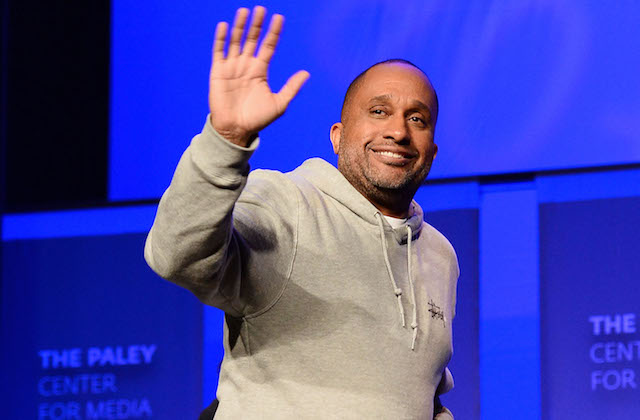"Black-ish" creator Kenya Barris largely stayed out of the furor surrounding a cancelled racial justice-focused episode of his hit ABC family sitcom. He finally speaks on the controversy and his exit from ABC in a new cover story for The Hollywood Reporter, which debuted online yesterday (September 12).
rnt
THR Cover: #Blackish creator Kenya Barris (@funnyblackdude) breaks silence on that shelved anti-Trump episode, his ABC exit and "unapologetic" @Netflix plans https://t.co/tCsr6WXH2g pic.twitter.com/W5D1Ul9uDw
rnt— Hollywood Reporter (@THR) September 12, 2018
rn
rntTHR describes the canned episode, "Please, Baby, Please," as an allegorical bedtime story that patriarch Dre Johnson (Anthony Anderson) tells baby Devante (August and Berlin Gross). The tale touches on events from the preceding year, including the treatment of anti-racist kneeling protests and the White supremacist Unite the Right violence. Barris, who THR writes “is strategic with his choice of words," admitted that the network and parent company Disney’s executives were concerned about alienating supporters of President Donald Trump:
rnt
Executives at ABC, more than any other network, have been forthright about their desire for more red-state programming since Trump’s win—and with Barris’ latest episode, they feared they’d be alienating the very population they’d tried so hard to court. That Disney brass wouldn’t want to poke Trump himself just as the company was seeking Justice Department approval of its acquisition of most of 21st Century Fox is widely believed to have been a factor as well.
t
What becomes clear in Barris’ presence is how loath he is to piss off a group of executives with whom he still has plenty of business. "I know there was some concern about partisanship," he says, "and the way the episode was angled and the balance in terms of some of the stories. On network TV, one of the things I’ve learned is that you have to talk about things from both sides."
Barris adds that he tried following the network’s edit notes, but it didn’t work:
rnt
At ABC’s urging, Barris had his editor test a few of the suggested cuts—but it wasn’t as easy as a nip here or a tuck there, and the sheer tonnage of anti-Trump material rippling through the episode ultimately made the exercise futile. Barris hated what came back. "What it ended up being, and I think the network would agree, was not a true representation of what we intended to do," he says. "Because if it was, we would’ve shown it." Unable to reach a compromise, they collectively decided to scrap it.
Barris says the conflict was one of several frustrations with the network that pushed him to get out of his ABC deal. They included pilots that never made it to series and moving "Black-ish" to a slot behind the reboot of "Roseanne," which was ultimately canned after its namesake star made racist comments about Valerie Jarrett. Barris says he would have publicly admonished the network had it not cancelled the show, "because fuck Roseanne."
He eventually signed a deal with Netflix, which he says offers him the space to be "loud, bold and unapologetic" and will help him demolish barriers to success for Black artists:
rnt
Barris is acutely aware of the racial breakdown in every room he inhabits, even occasionally roping his kids into a game he calls "Count the Black People." (When he took them to see "Hamilton" on Broadway, they counted Kareem Abdul-Jabbar and Oprah Winfrey.) It’s a broader topic that he loves exploring through his art, but he shudders at the notion of being some sort of poster child for Hollywood’s diversity push—and he’s not particularly interested in sitting on any more panels to pontificate on the subject, either. In fact, he’s so tired of talking about "diversity" that he once broke down in tears on an industry stage. "’Diversity’ became this catchphrase for the easing of liberal guilt and I felt like there was starting to be an overcorrection, which often happens, and overcorrections tend to re-correct themselves," he says. "Plus, I didn’t want to be a part of a moment; I wanted to be a part of a movement."
